Following the appeal of South Africa to the UN International Court of Justice, the documents concerning Israel's accusation of Gaza genocide were known. Israel responded to these charges, publishing more than 30 secret orders of civilian and military leaders, who, according to them, reveal a real picture of events and refute the accusations of genocide.
The publication of these documents, which became known through The New York Times, took place in connection with the appeal of South Africa to the UN International Court of Justice with the accusation of Israel's genocide. The essence of the accusation is that provocative public statements of Israeli leaders indicate the intention to commit genocide.
In its defense, Israel is trying to show that any statements of politicians have been reflected in official decisions and orders of military leadership. The exposed documents include the decisions of the Cabinet of Ministers, in which Prime Minister Benjamin Netanyaga orders to provide humanitarian aid, fuel and water to Gaza residents.
The UN International Court of Justice has started the case and should express the initial response to the petition of South Africa on a possible temporary ceasefire. Israel's defense, in particular, emphasizes that the intention to wage a legitimate war with Hamas is an important aspect and not a genocide of the Palestinian population.
Despite the fact that the court decision may take years, the court can implement "temporary measures". South Africa is trying to prove that the statements of Israeli leaders testify to the intention to commit genocide, not just about the signs of war.
Israel expressed its position before the UN International Court of Justice, presenting several emails between military officers and humanitarian workers. It is noted that these letters indicate Israel's efforts to provide gas, medicines and vaccines. Israeli defenders point out that if it was a desire to massively destroy the Palestinian population in gas, the country would not have cooperated with the UN in the supply of the necessary humanitarian assistance.
One of the emails from the UN representative to the Israeli officer responsible for the distribution of humanitarian aid in Gas indicated the details of the request for the supply of refrigerators on solar panels for storage of vaccines and laboratory tests. These messages were confirmed by the UN official as authentic.
International legal experts point out that secret orders and emails are an important element of context, but the court will only consider them as part of the overall image. The submission of Israel includes only a limited number of decisions made by the Government and the military leadership since October. Judges will have to evaluate whether these documents transmit a complete picture of Israeli's intentions.
The University of International Law Professor in London, William A. Shabas, indicated that judicial experts should determine whether there is enough holistic information to understand Israel's plans. He stressed that the actions of Israel on humanitarian aid should also be evaluated in the context of what is actually allowed on the ground.
"What may seem to support life does not necessarily reflect the opposite," said Professor Shabas. At the same time, he stated examples of blocking the UN assistance to the northern part of Gaza, which Israel denied, and the prevention of the UN about possible famine in the region due to lack of food and health care problems.


